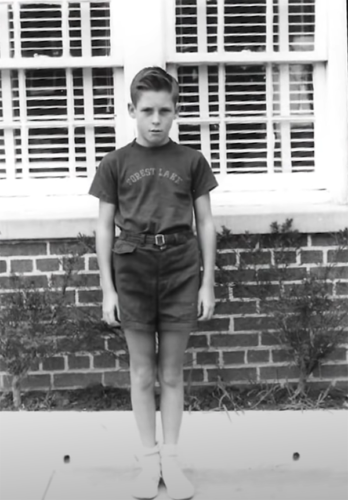Paul Ernst was a natural tinkerer who based his outlook on life on the material world that could be seen, quantified and studied.
“I liked knowing how things worked,” Paul says in a CBN video. “I wanted to drill down to the basis of something where it was, you know, like taking apart an alarm clock or later a motorcycle or a car engine.”
Attracted to sciences, he graduated from college with a degree in chemistry. He didn’t bother much with the notion of God because if he existed, he couldn’t be documented by scientific means.
“Even though I might think about where the universe came from, ‘Where there’s a God,’ ‘Is there life after death?’ I pushed those into unknowables.
“The picture I had of Christians is that since they weren’t in science, they were in another realm that was unknowable, and some of it actually looked kind of silly to me and I just wasn’t interested in that.”
 He stayed the course of scientific atheism through his 40s, but when he turned 50, a nagging sense of his mortality began to irritate him.
He stayed the course of scientific atheism through his 40s, but when he turned 50, a nagging sense of his mortality began to irritate him.
“I had a fear of dying,” Paul says. “I didn’t want to go into oblivion or even, or worse yet, into some kind of judgment.”
A friend, Tom Anderson, composed a paper called “A Lawyer Gives a Defense of the Divinity of Christ.” After reading it, Paul realized it made a lot of sense.
“I knew if this is true, this changes everything. This is huge. So I could immediately tell that this was something big that needed to be pursued,” he says. “But the bigger part of the picture is this individual had a roadmap for connecting the dots to where I, for the first time, saw the possibility of knowing whether it was true or not. And I thought ‘I’m not going to live forever; maybe I’d better look into these things and settle them.’”
Then another friend gave him Lee Strobel’s book, The Case for Christ.
“The book interviews Christian scholars on various topics like the resurrection, the reliability of the text, and as though this investigative reporter, Lee Strobel, is interviewing these different experts. And so I begin to mimic the process of what I see going on in The Case For Christ.
“It put me into a turmoil,” he remembers. “Is it true? Maybe it is. Maybe it isn’t.”
For a year, he mulled what he was learning, not withholding any book that might shed light on the subject.
Nevertheless, there was one outstanding omission from his reading list, the Bible.
 “Up to this point I’d been reading books about the Bible and other types of evidence for it, but I hadn’t actually read the Bible. I was sort of afraid to read it, that it would take me away from what I was now hoping to be true. But through my studies I learned about this passage called Isaiah 53, and I read it.”
“Up to this point I’d been reading books about the Bible and other types of evidence for it, but I hadn’t actually read the Bible. I was sort of afraid to read it, that it would take me away from what I was now hoping to be true. But through my studies I learned about this passage called Isaiah 53, and I read it.”
Isaiah 53 startled him. It’s hard-to-deny portrayal of Christ’s life and death in glaring detail could not have pre-dated the actual occurrence, he realized.
“There’s got to be a Transcendent Being above who has control of this book and knows the beginning and the end,’ because there’s information in here that only a being outside of time could know about,” he realized.
Then it dawned on him.
“I began to see that the Christian scholars really did have the upper hand in this game,” he says. “They had the goods. And it became increasingly apparent that the atheist side was a very weak argument.
“It was really based on the presupposition that the natural world was all there is. The tide really turned in favor of Christian truth. And at that point I really formed the idea ‘I’m compelled to believe this.’”
Paul asked Jesus Christ into his heart as his Lord and Savior and was born again.
“It was a feeling, I would say, of trust and of hope, because I was aware of a level of hopelessness in my life,” he says. “So I would say that the part of Christianity that struck me first and largest, was hope.”
Paul has been following Jesus since 2001. That was that year he wedded his beloved wife, Mary.
“When he talks about Isaiah 53 to others, he tears up because it’s so powerful,” says Mary. “The deep love of Our Lord Jesus is beyond words for me. There’s only victory in Christ. And both of us, if we’re speaking about our faith, we speak about Jesus.”
“So if Jesus rose from the dead, why did He rise from the dead?” asks Paul. “And the best explanation out of all the possible ones, both natural and from other religions, was that the God of the Bible raised Jesus from the dead.”
Paul’s book, You Bet Your Life, demonstrates his insightful excursion to Jesus Christ.
If you want to know more about a personal relationship with God, go here
Ryan Zepeda studies at the Lighthouse Christian Academy in Santa Monica.




